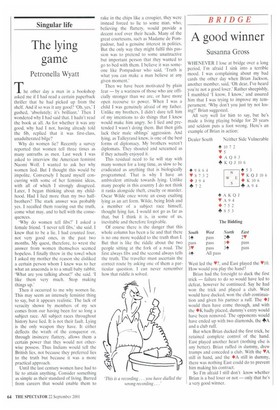Singular life
The lying game
PetroneIla Wyatt
The other day a man in a bookshop asked me if I had read a certain paperback thriller that he had picked up from the shelf. And if so was it any good? 'Oh, yes,' I gushed, 'absolutely; it's brilliant.' Then I wondered why I had said that. I hadn't read the book at all. As for whether it was any good, why had I not, having already told the fib, replied that it was first-class, unadulterated bilge?
Why do women lie? Recently a survey reported that women tell three times as many untruths as men. Last week I was asked to interview the American feminist Naomi Wolf. I wanted to ask her why women lied. But I thought this would be impolite. Conversely I heard myself concurring with some of her feminist ideas, with all of which I strongly disagreed. Later, I began thinking about my childhood. Had I lied more than my two halfbrothers? The stark answer was probably yes. I recalled them roaring out the truth, come what may, and to hell with the consequences.
'Why do women tell fibs?' I asked a female friend. 'I never tell fibs,' she said. I knew that to be a lie. I had counted four, not very good ones, in the past two months. My quest, therefore, to wrest the answer from women themselves seemed hopeless. I finally threw in the towel when I asked my mother the reason she disliked a certain person whom I knew was to her what an anaconda is to a small baby rabbit. 'What are you talking about?' she said. 'I like them very much. Stop making things up.'
Then it occurred to me why women lie. This may seem an intensely feminist thing to say, but it appears realistic. The lack of veracity shown by members of my sex comes from our having been for so long a subject race. All subject races throughout history have lied. It is not their fault. Lying is the only weapon they have. It either deflects the wrath of the conqueror or, through insincere flattery, allows them a certain power that they would not otherwise possess. Thus Indians would tell the British lies, not because they preferred lies to the truth but because it was a more practical approach.
Until the last century women have had to lie to attain anything. Consider something as simple as their standard of living. Barred from careers that would enable them to rake in the chips like a croupier, they were instead forced to lie to some man, who, believing the flattery, would provide a decent roof over their heads. Many of the great courtesans, such as Madame de Pompadour, had a genuine interest in politics. But the only way they might fulfil this passion was to pretend to some unattractive but important person that they wanted to go to bed with them. I believe it was someone like Pompadour who said, 'Truth is what you can make a man believe at any given moment.'
Then we have been motivated by plain fear — by a wariness of those who are officially stronger than we are, or have more open recourse to power. When I was a child I was genuinely afraid of my father. Unlike my brothers, I didn't dare tell him of my intentions to do things that I knew would make him angry. So I lied and pretended I wasn't doing them. But then girls lack their male siblings' aggression. And lying, as Talleyrand knew, is one of the best forms of diplomacy. My brothers weren't diplomats. They shouted and screamed as if they actually enjoyed it.
This residual need to lie will stay with many women for a long time, as slow to be eradicated as anything that is biologically programmed. That is why I have an ambivalent attitude towards lying. Unlike many people in this country I do not think it ranks alongside theft, cruelty or murder. Oscar Wilde once wrote an essay exalting lying as an art form. Wilde, being Irish and a member of a subject race himself, thought lying fun. I would not go as far as that, but I think it is, in some of us, inevitable and therefore forgivable.
Of course there is the danger that this whole column has been a lie and that there is no one more wedded to the truth than I. But that is like the riddle about the two people sitting at the fork of a road. The first always fibs and the second always tells the truth. The traveller must ascertain the correct route by asking one of them a particular question. I can never remember how that riddle is solved.










































































 Previous page
Previous page